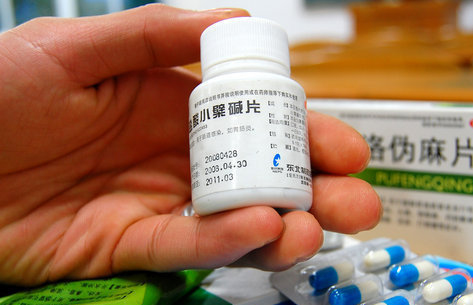Patients at public hospitals will save more money beginning today, when the government starts to heavily subsidize a list of common medicines.
China's first essential medicine list is part of the country's ongoing medical reform, which aims to assure all Chinese have basic healthcare services.
 |
|
CFP photo |
Most of the 307 drugs on the list are prescription-only drugs, 200 of which are western medicines. The rest are traditional Chinese medicines, which have long been used in China and are proven to be safe, effective and reasonably priced, experts say.
"The inclusion of essential medicines in the overall reform signals the government's intent to ensure high-quality care that is affordable for the whole population," said Vivian Tan, press officer of the Beijing office of the World Health Organization.
The list is a primary step in establishing a drug supply and usage institution that will secure drug safety and lower the general drug costs.
The institution will cover 30 percent of the cost of China's public medical facilities, particularly the grassroots ones, by 2011 and all of them by 2020.
"For patients, the national essential drug institution will help lower their drug expenses substantially," Hu Shanlian, public health expert with the Shanghai-based Fudan University, told China Daily yesterday.
Under the institution, different government agencies will work together to ensure ample supply, safety and quality of the listed drugs for the treatment of the most common diseases, and promote their uses at public hospitals, Hu said.
Previously, some cheap but effective drugs were not available largely due to pharmaceutical companies not producing them. Instead, the companies focused on the manufacture of drugs that were more profitable, reports said. Therefore, patients had no choice but to pay more for drugs.
That in turn passed on the cost to the government, which aims to cover more than 90 percent of the entire population by 2011 through the health reform.
Currently, the annual drug cost of China is approximately 500 billion yuan ($73 billion), accounting for more than 45 percent of the country's entire healthcare expenditures, official statistics show.
"It's much higher than the international average of 20 to 30 percent," Hu said.
The usage of the more common, essential drugs at health facilities, which now takes up 25 percent of the total drug use, will be widened under the institution and thus lower the total drug costs, he said.
Listed drugs will be sold with zero cost added at the grassroots health facilities in both rural and urban areas.
"More patients will go to grassroots health facilities at community level or village level for cheaper drugs, which will help optimize limited medical resources," Hu said.
Some Chinese welcome the new initiative.
"I don't understand why drugs for a common cold costs me nearly 1,000 yuan," said Yuan Kang in Beijing.
"I hope with the new system I can have cheap and good medicines," the 26-year-old office clerk said.
Zhao Mingwu, who heads the internal medicine department with the leading Peking University Third Hospital in Beijing, also welcomed the essential drug institution.
The system will ensure drug supply for health facilities, particularly grassroots ones, and lower medicine costs substantially for patients, he said.
The list will be updated every three years to better meet the demands of both doctors and patients.
(China Daily August 19, 2009)